|
|
|
Sort Order |
|
|
|
Items / Page
|
|
|
|
|
|
|
| Srl | Item |
| 1 |
ID:
080538
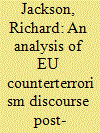

|
|
|
|
|
| Publication |
2007.
|
| Summary/Abstract |
This article examines the main characteristics and evolution of European Union counterterrorism discourse, primarily through a comparison with United States counterterrorism discourse since September 11. It argues that while both actors share a great deal in common in the language they employ about terrorism, there are a number of subtle but highly significant differences. The article also argues that there have been a number of important evolutions in the discourse of EU officials over the past five years. The article concludes that the nature and construction of official EU terrorism discourse has a number of important analytical, normative and practical implications, not least because it rests upon a series of highly contested assumptions and narratives about the nature and causes of the terrorist threat
|
|
|
|
|
|
|
|
|
|
|
|
|
|
|
|
| 2 |
ID:
093693
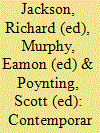

|
|
|
|
|
| Publication |
London, Routledge, 2010.
|
| Description |
xiv, 242 p.
|
| Series |
Critical terrorism studies
|
| Standard Number |
9780415498012
|
|
|
|
|
|
|
|
|
|
|
|
Copies: C:1/I:0,R:0,Q:0
Circulation
| Accession# | Call# | Current Location | Status | Policy | Location |
| 054839 | 327.117/JAC 054839 | Main | On Shelf | General | |
|
|
|
|
| 3 |
ID:
094574
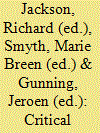

|
|
|
|
|
| Publication |
London, Routledge, 2009.
|
| Description |
xiii, 274p.
|
| Standard Number |
9780415455077
|
|
|
|
|
|
|
|
|
|
|
|
Copies: C:1/I:0,R:0,Q:0
Circulation
| Accession# | Call# | Current Location | Status | Policy | Location |
| 054854 | 363.325072/JAC 054854 | Main | On Shelf | General | |
|
|
|
|
| 4 |
ID:
105370
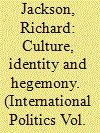

|
|
|
|
|
| Publication |
2011.
|
| Summary/Abstract |
This article explores the social and political construction of US counterterrorism policy since the onset of the war on terrorism. The first part of the article focuses on the period of the Bush administration. It explores the cultural grammar expressed in the language of the war on terror, as well as administration attempts to 'sell' the policy to the American public. In addition, it explores the ways in which the war on terror has been institutionalised in counterterrorism practices and institutions, and how it has been normalised and embedded in American popular culture and linked by the national identity narratives surrounding '9/11' and the negative ideograph of 'terrorism', to American identity. Section two of the article explores the discourse and practice of the war on terrorism in the initial period of the Obama administration. It questions the extent to which counterterrorism policy can be rewritten, given the degree to which it accords with the deep cultural grammar of American identity and is now a well-established ideograph, the extent to which it has been institutionalised in American political practice and embedded in American culture and the ways in which it is rooted in the political-economic interests of the American polity and empire. Finally, the article briefly reflects on questions of change and identity in the construction of US foreign policy.
|
|
|
|
|
|
|
|
|
|
|
|
|
|
|
|
| 5 |
|
| 6 |
ID:
101666
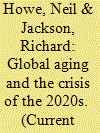

|
|
|
| 7 |
ID:
131759
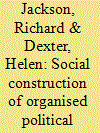

|
|
|
|
|
| Publication |
2014.
|
| Summary/Abstract |
This article proposes a general analytical framework for how we might better understand intrastate war and related forms of organised political violence. It begins by setting out our understanding of agency and structure, before outlining the key structures and agents central to the social construction of political violence. This is followed by a discussion of some of the common discursive practices frequently observed in the lead-up to the outbreak of organised violence, such as the widespread articulation of threat and victimhood narratives, the demonisation and dehumanisation of an enemy other, the renegotiation of norms of violence and the suppression of counter-hegemonic and anti-violence voices. The article argues that organised and sustained political violence is contingent on two key facilitating conditions. First, the presence of a particular set of material and discursive structures, including the military instruments for sustained violence, an economic basis for prosecuting war and a set of society-wide military norms, values and practices; and second, willing and capable agents who can transform the structural potential of the society or group into active participants in violence. The interaction of structures, agents and discursive practices can, in particular historical and spatial contexts, create the specific conditions which make organised violence possible. The discussion is illustrated by reference to a number of recent and historical wars, including the war on terror
|
|
|
|
|
|
|
|
|
|
|
|
|
|
|
|
| 8 |
ID:
019774
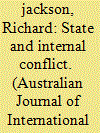

|
|
|
|
|
| Publication |
April 2001.
|
| Description |
65-81
|
| Summary/Abstract |
Research into the causes of contemporary international conflict faces a number of conceptual limitations, which in turn limits the effectiveness of international conflict resolution efforts. Typically, today's internal conflicts are conceived of as irrational outbursts of 'ethnic' hatred, or the breakdown of normally peaceful political systems. In this paper, I argue that the causes of internal conflicts are, in fact, located in the structures of weak states and the actions of weak state elites, who may deliberately engender conflict as a rational response to the internal and external demands brought on by the intrusive processes of globalisation. In this sense, internal conflict is a 'normal' aspect of weak state politics. The weak state framework not only provides a more satisfying explanation of internal conflict, but it has profound implications for conflict resolution. It suggests that conflict resolution must be focused on state reconstruction activities, rather than on saving failing states. It also suggests that there are likely to be many more internal conflicts which demand international action in the future.
|
|
|
|
|
|
|
|
|
|
|
|
|
|
|
|
| 9 |
ID:
141290
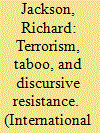

|
|
|
|
|
| Summary/Abstract |
More than a decade of the war on terror has increased levels of direct and structural violence and strengthened the forces of political oppression across the globe. Within this historical material context, as well as the intellectual context of the “narrative turn” and the wider “cultural turn” currently underway in International Relations, this article explores the ways in which the terrorism novel might act as a mode of discursive resistance or literary resistance to these (oppressive) forms of power, as a site of emancipatory agonistic politics, and as a social scientific method of analysis. Among possible forms of discursive resistance, the novel—as a narrative mode—has genuine potential due to its affective as opposed to confrontational form, its engagement with the emotional aspects of international politics, its lack of conventional boundaries, and its potential reach. However, to date, the terrorism novel has not realized its potential as a mode of resistance, but has instead tended to reinforce the counterterrorism truth regime by reinforcing and maintaining the modern terrorism taboo. In this respect, the publication of Confessions of a Terrorist: A Novel (Jackson 2014) represents something of a watershed, as it is one of the first sympathetic fictional depictions of a terrorist and the first to give primary voice to the perspective of the terrorist. Allowing the terrorist to speak not only acts to resist and undermine the terrorism taboo and generate empathetic projection, but potentially also creates an agonistic moment in which the violent subaltern can speak on an equal footing directly to the counterterrorist—and by extension, to the reader. The article concludes by reflecting on the potential of the novel as a site of both resistance and agonistic encounter and the challenges of employing literary resistance to domination.
|
|
|
|
|
|
|
|
|
|
|
|
|
|
|
|
| 10 |
ID:
064837


|
|
|
|
|
| Publication |
Sep-Oct 2005.
|
|
|
|
|
|
|
|
|
|
|
|
|
|
|
|
|
|
|
|
|